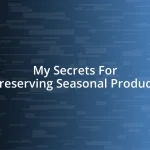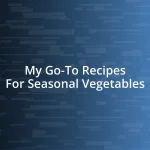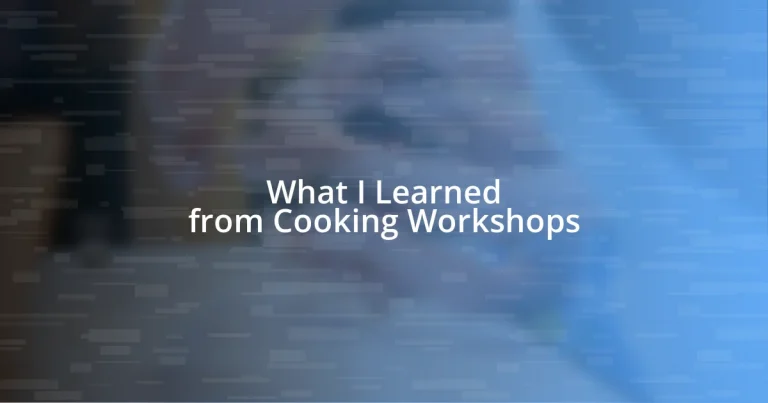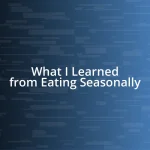Key takeaways:
- Cooking workshops foster a sense of community and friendship, enhancing personal and professional networks through shared culinary experiences.
- Participants gain essential culinary skills such as knife handling, flavor balancing, and time management, boosting both creativity and confidence in the kitchen.
- Experimentation and the ability to overcome challenges in cooking lead to personal growth, with failures becoming valuable lessons in creativity and resilience.
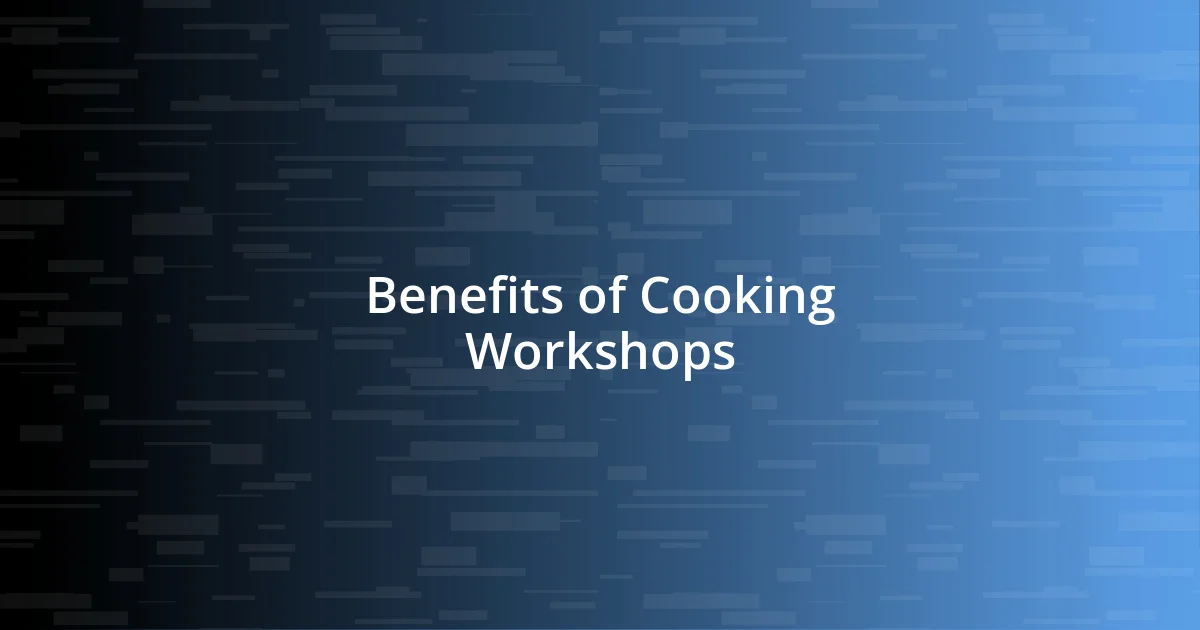
Benefits of Cooking Workshops
One of the most rewarding aspects of cooking workshops is the sense of community they foster. I remember my first workshop: I walked in feeling nervous and a bit isolated. But as soon as we started chopping vegetables together, laughter filled the room. Isn’t it incredible how food can bring people together?
In addition to connection, cooking workshops are a fantastic way to boost your culinary skills. I vividly recall the moment I learned to properly julienne carrots. It felt like a small victory, but it ignited my passion for cooking. Have you ever tried a new technique that completely transformed your approach to a dish? Those “aha” moments are what make workshops so special.
Lastly, there’s something undeniably therapeutic about cooking. The act of kneading dough or sautéing onions can serve as a mindful escape from daily stressors. I often find myself absorbed in the process, forgetting about everything else for a little while. Doesn’t it feel good to engage all your senses in the kitchen? The aromas, the textures, and even the sounds of cooking can create a profound sense of joy and presence.

Skills Gained in Workshops
Cooking workshops have a remarkable way of sharpening essential culinary skills. I still think back to the first time I tried my hand at kneading bread dough; the tactile experience was grounding, almost meditative. Each push and fold taught me not just technique, but patience and precision—a wonderful lesson applicable both in and out of the kitchen.
Here are some specific skills I gained during various workshops:
– Knife Skills: Learning how to handle a chef’s knife confidently was a game changer.
– Flavor Balancing: I picked up the nuances of balancing sweet, salty, acidic, and bitter flavors, making every dish sing.
– Presentation: I learned the art of plating, transforming a simple dish into something visually arresting.
– Time Management: Juggling multiple tasks in the kitchen taught me to work efficiently—a skill that pays off in everyday cooking.
– Cultural Techniques: Each workshop introduced me to new cooking styles and cultural techniques, enriching my culinary repertoire.
This blend of practical skills not only elevates my cooking but also nurtures my creativity and adaptability in the kitchen, which I find incredibly fulfilling.
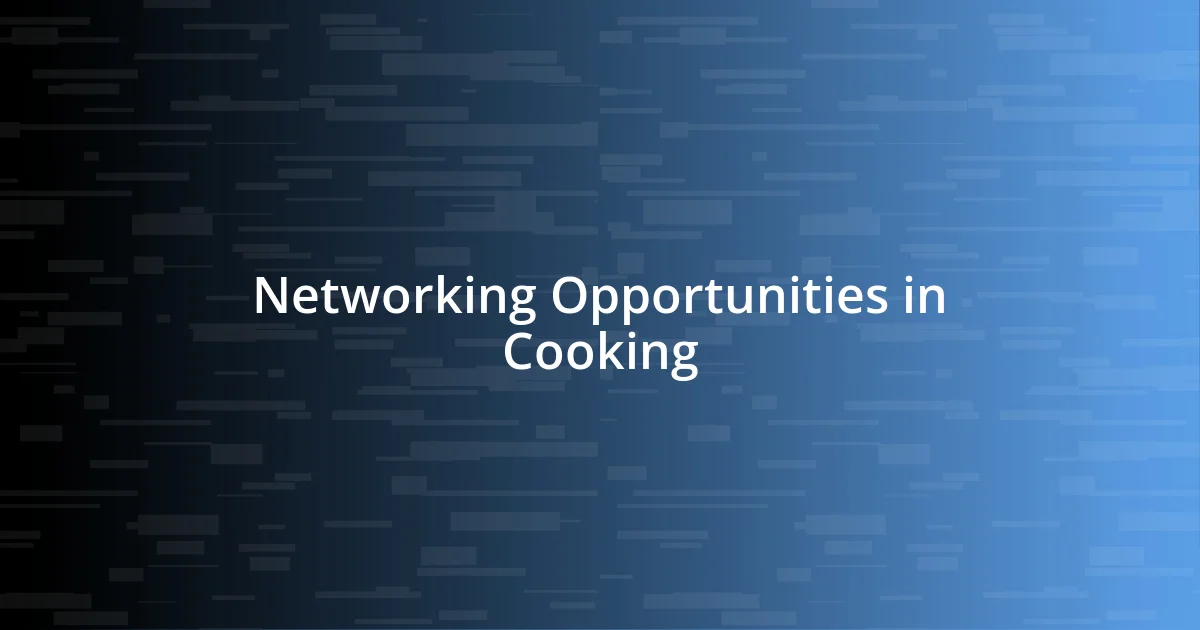
Networking Opportunities in Cooking
Networking in cooking workshops is an unexpected treasure. During one workshop, I met a fellow participant who later became my trusted dinner party co-host. Sharing our love for cooking ignited a friendship that extended beyond the kitchen, emphasizing how these shared experiences foster connections. Have you ever formed a meaningful relationship over a simmering pot of stew? It just goes to show that collaboration can lead to genuine bonds.
Moreover, these workshops often attract individuals from diverse backgrounds, offering the chance to meet experienced chefs, home cooks, and food enthusiasts alike. I recall chatting with a professional chef who shared insights into the culinary industry that I found invaluable. Such conversations not only expanded my network but also provided guidance on pursuing my culinary dreams. Isn’t it wonderful how a shared interest can open doors to mentorship and collaboration?
Finally, participating in cooking workshops can enhance your professional connections. Many chefs and cooking instructors are well-connected in the food industry, and casually networking can lead to exciting job opportunities or collaborations. I once learned that a connection I made through a workshop could potentially lead to a position at a local restaurant. It’s exciting to think about how a simple cooking class can transition into a stepping stone for your culinary career!
| Networking Opportunities | Benefits |
|---|---|
| Forming Friendships | Create lasting relationships through shared experiences. |
| Mentorship | Learn from experienced professionals and gain valuable insights. |
| Career Connections | Access job opportunities and collaborate in the culinary field. |

Experimenting with New Recipes
Experimenting with new recipes has been a thrilling journey for me. One memorable moment was when I decided to try my hand at a spicy Thai green curry. The process was a delightful dance of chopping fresh herbs, balancing flavors, and deglazing the pan. It felt so rewarding to bring together ingredients I’d never used before and watch them transform into something aromatic and vibrant. Have you ever felt that rush of excitement when a dish you created makes your taste buds tingle?
During these cooking workshops, I learned that experimentation is key to discovering new flavors. For instance, I once swapped out traditional ingredients for unexpected ones, like using coconut milk in a savory dish. The outcome surprised me in the best way possible, highlighting how a little creativity can elevate a recipe. Why not step outside of your culinary comfort zone? You might just stumble upon a new family favorite!
I’ve also realized that failures in the kitchen often lead to the best lessons. Remember that time I attempted a soufflé, only to have it collapse? Instead of feeling defeated, I took mental notes on what went wrong and tried again. Nothing beats the feeling of experimentation leading to success after some trial and error. Isn’t it fascinating how cooking can reflect life itself—full of unexpected twists and valuable lessons?
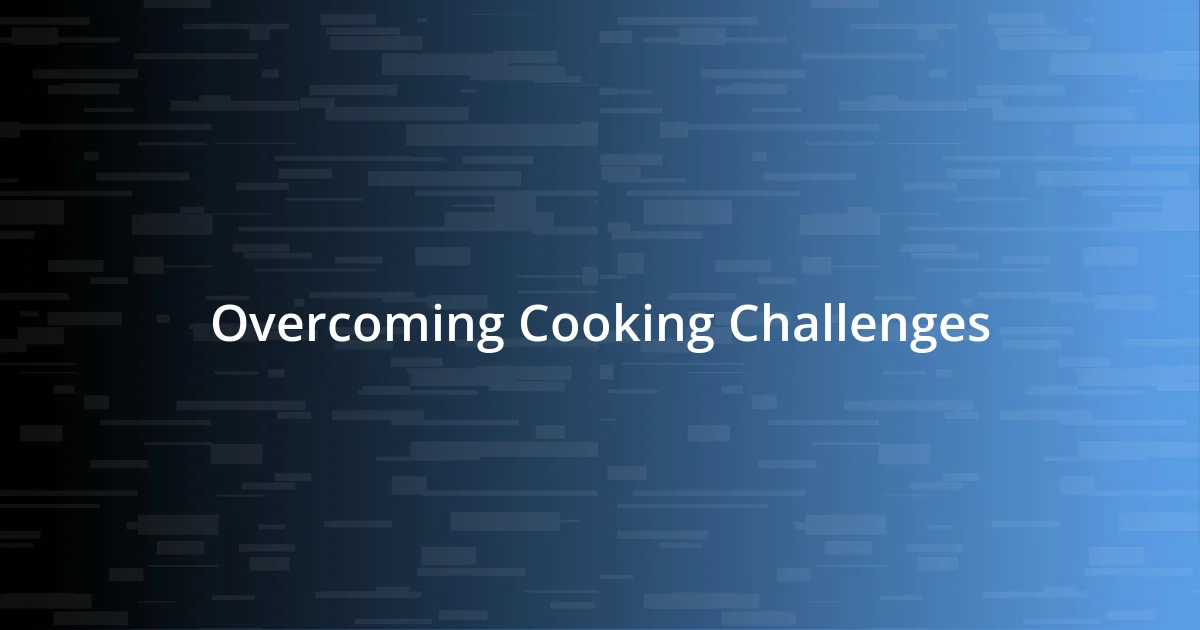
Overcoming Cooking Challenges
It’s amazing how cooking challenges push us to think creatively and adapt quickly. I remember a time when I was trying to perfect a delicate pasta dish, and halfway through, I realized I had run out of my go-to sauce ingredient. Instead of panicking, I scoured my pantry and found a jar of sun-dried tomatoes. The improvised sauce turned out to be a zesty hit! Have you ever turned a kitchen blunder into something delicious?
Working with different culinary techniques also came with its share of challenges. There was an instance during a knife skills class when I struggled to achieve that perfect julienne cut. Initially, I felt embarrassed, watching others slice away with ease. But the instructor patiently guided me, emphasizing practice over perfection. Each attempt brought me closer to mastery, reinforcing my belief that growth stems from perseverance. Isn’t it comforting to know that we all start somewhere when learning a new skill?
Lastly, I’ve found that managing time is often the biggest hurdle in cooking. One day in a workshop, we had to prepare multiple dishes within a tight schedule. The pressure was intense as I hustled between chopping ingredients and stirring pots. Yet, when it all came together at the end, the satisfaction was unparalleled. This experience taught me not just about time management in the kitchen, but also the importance of staying calm under pressure. How do you cope with the ticking clock when you’re cooking? For me, staying organized and focused became the key to overcoming that challenge.

Insights from Professional Chefs
The insights I’ve gained from professional chefs have been nothing short of transformative. One chef I encountered shared a powerful mantra: “Cook with intention.” This resonated with me deeply. I found that approaching each dish with a clear purpose not only enhances flavor but also elevates the cooking experience. Have you ever noticed how cooking can feel more meaningful when you’re fully present in the moment?
During a workshop, I had the privilege of watching a chef effortlessly create a delicate sauce. I was captivated by how she spoke about taste balance, explaining how acidity, sweetness, and saltiness work together like a harmonious symphony. It struck me that cooking is not just about following a recipe—it’s about understanding how ingredients interact. I tried her method in my kitchen and was amazed at how small adjustments can turn a simple dish into something extraordinary. Has experimenting with flavor combinations ever led you to surprise yourself in the kitchen?
Observing the chefs’ commitment to their craft taught me the value of passion in cooking. I remember one chef who seemed to light up when discussing his favorite ingredients, almost as if they were trusted friends. This passion was infectious, inspiring everyone in the room to engage more with the food we were preparing. How can we bring that same enthusiasm into our everyday cooking? For me, embracing that energy has made cooking not just a task, but an enjoyable and creative outlet.

Applying Workshop Knowledge at Home
Applying what I learned from cooking workshops at home has been a game changer. For instance, after a workshop on seasoning, I decided to experiment with herbs and spices in my favorite roasted vegetables. I vividly remember the moment I added fresh thyme, and the aroma wafted through my kitchen. It was a simple tweak, but it whisked the dish to new heights. Have you ever transformed a familiar dish with a pinch of creativity?
I also learned to embrace mistakes as part of the cooking journey. Just the other day, I attempted a risotto that didn’t come out quite right; it was too sticky. Instead of being discouraged, I turned it into arancini—little fried risotto balls. The experience reminded me how versatile ingredients can be and how every stumble can lead to a delightful surprise. Have you found ways to turn kitchen mishaps into kitchen victories?
Lastly, I’ve taken to planning my meals more thoughtfully. After a workshop on meal prep, I now dedicate a Sunday afternoon to batch cooking. This habit not only saves me time during the week but also encourages mindful eating. I recall filling containers with colorful roasted veggies and grains, feeling a sense of accomplishment. How does your meal planning influence your cooking routine? For me, it transforms dinner from a chore into a celebration of flavors waiting to unfold.










